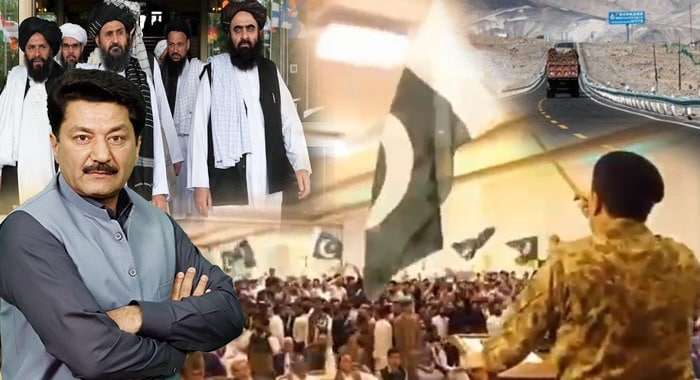When the Director General of ISPR recently addressed students in Peshawar, it reflected the current national atmosphere, one shaped by heightened tensions with India. The energy was palpable; the reception was passionate. Speaking primarily to Pashtun students, he naturally addressed issues related to tribal regions, the role of Pashtuns, and Afghanistan.
He made it clear: our issue is not with the Afghan people, who share with us religion, culture, language, and traditions. The concern lies with the Afghan elite, past and present, whether during the Karzai or Ghani eras, or the current regime. He urged them not to become proxies for Indian interests.
He pointed to how proxy networks operating in Pakistan, particularly in Balochistan and Khyber Pakhtunkhwa, are backed by India, with evidence of training camps and leadership networks using Afghan soil. However, a positive development is emerging: Afghanistan has assured Pakistan and China that its soil will not be used against any other country.
Unlike the past, these assurances are now translating into real actions. In recent weeks, Afghanistan has begun curbing anti-Pakistan militants operating from its territory. Arrests have been made, cross-border infiltrators intercepted, all without push-back from the Afghan government. This reflects a growing understanding between the two countries.
At a time of regional realignment, both India and Pakistan are expanding their diplomatic outreach. India has mobilised its envoys worldwide. Meanwhile, Pakistan has launched its diplomatic offensive, with Prime Minister Shehbaz Sharif, Foreign Minister Ishaq Dar, Army Chief Field Marshal Asim Munir, and others visiting Turkey, Azerbaijan, Iran, and Tajikistan.
In contrast to the Indian boycott of certain products in Muslim-majority countries, China remains Pakistan’s unwavering ally, especially after recent tests of friendship during moments like the “Pahalgam Attack”. India had hoped to gain Afghanistan’s open support, but even the U.S. has not stood as firmly behind India as expected. Donald Trump’s past praise for Pakistan’s stance on Kashmir continues to irk the Indian media.
India’s much-hyped “Operation Sindoor” remains inconclusive. Meanwhile, Pakistan’s “Operation Bunyanum al-Marsoos” reached its logical end, with tangible success and official closure. In contrast, the name “Sindoor” is seen by some as Modi’s personal allusion, yet many of his plans have backfired.
In Peshawar, the DG ISPR once again raised the slogan: “Kashmir will become Pakistan.” He reminded the audience of the key role Pashtun tribal fighters played in the liberation of present-day Azad Jammu and Kashmir. Today, the mood across Pakistan is one of defiance and unity, we are not divided into Baloch, Punjabi, Pashtun or Sindhi. We are Pakistanis.
To those who question whether Pakistan truly achieved a victory in its latest standoff, one need only ask: If India won, why is it unable to celebrate? A victorious nation doesn’t remain silent.
The DG ISPR’s address was fiery and inspirational, especially for the youth. But internal and external fronts remain active: Pakistan must manage both counter-terrorism and foreign diplomacy in tandem.
On terrorism, there’s friction between federal and provincial policies, particularly over how to deal with Fitnah al-khwarij, the banned Tehreek-e-Taliban Pakistan (TTP). While Khyber Pakhtunkhwa government has floated talks with TTP, counter-terrorism is a national issue requiring unified strategy and coordination among provinces, federal institutions, and the military.
Regarding Afghan refugees, both the federal and provincial governments agree that repatriation should be dignified and voluntary. Yet, thousands continue to return only to re-enter Pakistan illegally, especially in Khyber Pakhtunkhwa. A more consistent and firm policy is needed to manage this.
Afghanistan’s future depends on its people, not just those who remained, but also the wealthy diaspora and business elites abroad. If they return and invest, set up factories, and create jobs, real development becomes possible. International aid agencies should begin channelling their support within Afghanistan itself, not just in refugee camps in Pakistan.
The op-ed also calls out lack of unity in political symbolism. For example, the absence of KP’s Chief Minister in national meetings and military briefings sends a fractured image of Pakistan to the world. At a time when unity is essential, especially in front of adversaries like India, such gestures damage national solidarity.
PTI’s provincial leadership must rise above party lines during key national forums. The Chief Minister must represent his province’s interest, not through political boycotts but by showing up at critical moments. Whether it’s a high-level photo session or a formal dinner hosted by the Army Chief, national integration must transcend politics.
As we’ve told the Afghan Taliban: You were once a guerrilla group, but now you are a government, behave like one. The same applies to political parties in Pakistan. The name Pakistan is above all else, a shared identity, not a divisible asset.





